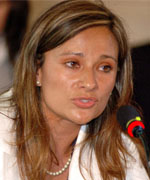Each year the OAS Secretary General publishes a proposed Program-Budget for the coming calendar year. The OAS General Assembly meets in a Special Session to approve the Program-Budget. Find these documents from 1998-2013 here.
Each year in April, the OAS Board of External Auditors publishes a report covering the previous calendar year’s financial results. Reports covering 1996-2016 may be found here.
Approximately six weeks after the end of each semester, the OAS publishes a Semiannual Management and Performance Report, which since 2013 includes reporting on programmatic results. The full texts may be found here.
Here you will find data on the Human Resources of the OAS, including its organizational structure, each organizational unit’s staffing, vacant posts, and performance contracts.
The OAS executes a variety of projects funded by donors. Evaluation reports are commissioned by donors. Reports of these evaluations may be found here.
The Inspector General provides the Secretary General with reports on the audits, investigations, and inspections conducted. These reports are made available to the Permanent Council. More information may be found here.
The OAS has discussed for several years the real estate issue, the funding required for maintenance and repairs, as well as the deferred maintenance of its historic buildings. The General Secretariat has provided a series of options for funding it. The most recent document, reflecting the current status of the Strategy, is CP/CAAP-3211/13 rev. 4.
Here you will find information related to the GS/OAS Procurement Operations, including a list of procurement notices for formal bids, links to the performance contract and travel control measure reports, the applicable procurement rules and regulations, and the training and qualifications of its staff.
The OAS Treasurer certifies the financial statements of all funds managed or administered by the GS/OAS. Here you will find the latest general purpose financial reports for the main OAS funds, as well as OAS Quarterly Financial Reports (QFRs).
Every year the GS/OAS publishes the annual operating plans for all areas of the Organization, used to aid in the formulation of the annual budget and as a way to provide follow-up on institutional mandates.
Here you will find information related to the OAS Strategic Plan 2016-2020, including its design, preparation and approval.
About the Mission
The Mission to Support the Fight against Corruption and Impunity in Honduras works to support the country in combating corruption and impunity with an integral vision.
Not only do we investigate cases involving relevant networks of public and private corruption, our effort is also focused on reforming and strengthening institutions that would prevent this scourge undermining the credibility of the authorities and the political system.
We are the first mission in the history of the OAS working to support the fight against corruption in a Member State. Our aims are to actively collaborate with the country's institutions and civil society to dismantle the scaffolding that promotes corruption and impunity, and strengthen the mechanisms for judicial investigation, control of public resources and control of power.
The MACCIH acts with full autonomy and independence: only governed by the agreement between the OAS with the Government of Honduras, signed on January 19, 2016 and, within that framework, by the instructions of the Secretary General. The MACCIH began operations in Honduras on April 19, 2016.
1. To contribute to the fulfillment by the Honduran State of the international commitments it acquired through the Inter-American Convention against Corruption and the MESICIC, the American Declaration of the Rights and Duties of Man, and the United Nations Convention against Corruption (UNCAC);
2. To support, strengthen, and collaborate actively with the institutions of the Honduras State charged with preventing, investigating, and punishing acts of corruption;
3. To help improve coordination between the different State institutions working in this area;
4. To propose reforms of the Honduran justice system to the Government, including legislation on strengthening the fight against corruption in and from the private sector; and
-
5. To help strengthen the accountability mechanisms with which the State’s justice agencies report to Honduran society, and the mechanisms with which civil society observes and monitors the justice system.
Thematic Areas
The MACCIH develops its efforts through 4 large workspaces:
1. Prevention and Fighting against Corruption
The MACCIH works with the authorities and institutions in Honduras that are in charge of investigating, prosecuting, judging and punishing corruption while recovering the assets and goods seized from corruption acts. In that sense, it strives to actively collaborate in the investigation of important corruption cases together with judges and a team of prosecutors that have been selected and certified, the Attorney General’s Office, and other State entities.
This will be one of the MACCIH’s most important contributions, because through the participation of its teams of prosecutors, financial forensic experts, police investigators and expert international analysts, it seeks to dismantle corruption networks in the public and private sectors. Also, the MACCIH will collaborate with the participation of international judges so that the judiciary in Honduras can decide, judge and sanction independently, effectively and respecting the due process of law regarding corruption network and cases.
In addition, this element will work on a series of institutional and normative reform initiatives to improve the entities in charge of controlling and overseeing the public sector at every level (national and sub-national), seeking to support the country in the construction of a better structure to prevent and combat corruption.
We will develop a program to fulfil the commitments regarding the Inter American Convention against Corruption. Finally, longing for high levels of consensus with civil society and the public institutions, we will support the elaboration of a
National Plan against Corruption, which we hope will be the road map to reform the country in this matter.
- Work in the Investigation Area (Spanish)
- Fulfillment of the Inter-American Convention against Corruption (MESICIC) (Spanish)
- Reforms to Combat Corruption and Impunity (Spanish)
Será conformada por jueces, fiscales y policías internacionales, así como especialistas forenses, analistas internacionales y otros profesionales, que desplegarán esfuerzos en tareas de investigación y persecución de grandes casos de corrupción que la propia MACCIH determinará, conjuntamente con fiscales nacionales que serán seleccionados y certificados por la Misión.
MACCHI considera que la transferencia de capacidades ocurre en la práctica y no en salones de capacitación. En ese sentido, con el trabajo cotidiano, dejaremos implantada en Honduras la tecnología de investigación y buenas prácticas jurisdiccionales en materia de corrupción compleja a nuestros colegas hondureños. En cuanto a la investigación y persecución, esto implica que colaboremos activamente con modernas técnicas para determinar los flujos financieros de los corruptos, cómo están lavando el dinero robado, cómo opera su contabilidad, cómo se relacionan como organización criminal, entre otros aspectos, además de colaborar en la formulación de la acusación y el litigio de los casos.
Honduras ratificó la Convención Interamericana contra la Corrupción en 1998 y suscribió la Declaración sobre el Mecanismo de Seguimiento de la Implementación de la Convención Interamericana contra la Corrupción (MESICIC) en el 2001. El MESICIC ha realizado 4 rondas de evaluaciones y Honduras ha participado en 3. Cada ronda evalúa el cumplimiento de las recomendaciones presentadas en rondas anteriores, así como aquellas disposiciones de la Convención preseleccionadas por el Comité de Expertos.
El MESICIC inició en abril del 2016 la 5ta ronda, en donde están priorizando tres temas importantes: compras públicas, sistemas de acceso a la función pública y mecanismos de protección de denunciantes. En septiembre de 2016 estará listo el informe que será público y se iniciará por el MESICIC el proceso para elaborar un Plan de Acción Nacional para la implementación de las recomendaciones.
Las propuestas de reformas institucionales y normativas para enfrentar la corrupción son efectuadas por una Unidad especializada de la MACCIH, que se encarga de analizar los problemas que limitan la actuación del Estado en la investigación, persecución, juzgamiento y sanción de la corrupción y la recuperación de los activos y bienes y propone fórmulas de reforma institucional y normativa que permitan atacar el problema de raíz.
-
2. Reform of Criminal Justice
In order to improve criminal justice and reduce the high levels of impunity, we seek to promote, with the institutions of the justice system and the civil society, a reform that allows better access to justice, reduces judicial delays, improves the mechanisms of criminal investigation, and effectively manage the criminal process and optimize the quality of judgments, among other changes.
With this objective, and with the perspective of establishing mechanisms for citizen oversight towards justice and accountability, a decentralized system of observation and monitoring of criminal justice based on the judicial organization of the country will be built with the civil society.
- Reforms of the Criminal Justice System (Spanish)
- Observatories System of Criminal Justice (Spanish)
La MACCIH
conformará un grupo de expertos del Centro de Estudios de Justicia de las Américas, (CEJA),
quienes elaborarán un diagnóstico sobre el estado de la situación del Sistema de Justicia Penal hondureño.
De forma previa,
realizarán una revisión y análisis de todos aquellos estudios e investigaciones realizados con anterioridad, así como aquellas reformas realizadas por las instituciones del Sistema de Justicia Penal, con espacial énfasis en las evaluaciones y resultados de estas reformas.
El diagnóstico analizará de forma global el comportamiento y los resultados del Sistema de Justicia Penal, así como aspectos específicos de cada insitución del sistema como: sistemas de gobierno, ubicación institucional, niveles de autonomía, capacidad de cumplimiento de sus misiones institucionales, procesos de trabajo internos, y modelos de organización interna.
Finalmente, se elaborará un conjunto de recomendaciones de diversa profundidad y alcance, para el fortalecimiento de la calidad, efectividad y legitimidad del sistema de justicia penal hondureño.
El Observatorio de Justicia Penal de la MACCIH estará integrado por organizaciones académicas y de la sociedad civil, las cuales crearán y se guiarán por una matriz de evaluación permanente del Sistema de Justicia Penal hondureño.
El objetivo de dicho observatorio es el supervisar y promover la adecuada implementación de la reforma del Sistema de Justicia Penal hondureño.
En base a la matriz de evaluación, el observatorio realizará funciones de monitoreo, investigación, análisis, observación in situ, y evaluaciones cualitativas y cuantitativas, y emite informes periódicos que permitirán a los operadores institucionales y al público identificar problemas estructurales, retrocesos, avances y recomendaciones sobre dicha implementación.
-
3. Political-Electoral Reform
The MACCIH deploys a technical approach so that the country has effective standards to regulate political funding and electoral campaigns.
Considering that the irregular financing of funds for candidates and parties explains much of the source of political corruption, the Mission aims to promote a law of this type, in conjunction with other electoral reforms.
Reforma Político Electoral
El financiamiento de la política es necesario para mantener partidos políticos fuertes, organizar una competencia política abierta y comunicarse con los ciudadanos. Los sistemas de financiamiento político contribuye mediante reglas y normas que se regulen el uso de los recursos económicos en los partido políticos.
Desde el 2012, las Misiones de Observación Electoral (MOE) de la OEA cuentan con una metodología de financiamiento político-electoral que permite observar de manera cuantitativa y cualitativa los procesos electorales en la región.
Durante la MOE/OEA del 2014, la Misión realizó una serie de recomendaciones encaminadas a considerar reformas al marco normativo en materia de financiamiento político y electoral, a fin de establecer reglas de participación para los partidos políticos.
En este marco se pretende acompañar a la implementación de esta recomendación mediante la creación de un marco normativo equitativo y transparente.
-
4. Public Security
We support institutions to improve the National System for Citizen Security of Honduras. A critical point will be to support the professionalization of the police and the implementation of mechanisms for protection of human rights defenders, journalists, communicators and especially operators of justice.
- Follow-Up to the Evaluations of the SNSC (Spanish)
- Protection of Human Rights Defenders, Journalists, Media Personnel, and Justice Officials
(Spanish)
El Departamento de Seguridad Pública de la Secretaría de Seguridad Multidimensional de la OEA viene trabajando de manera sostenida con el Gobierno de la República de Honduras, desde la elaboración de la primera evaluación del Sistema Nacional de Seguridad Ciudadana (SNSC) en el 2012. En seguimiento a dicho ejercicio, se llevó a cabo una segunda evaluación del SNSC, cuyos resultados fueron presentados al Gobierno hondureño en julio de 2014.
Se plantea en esta propuesta apoyar en la implementación de las recomendaciones de esta evaluación.
En mayo del 2015, Honduras aprobó la Ley de Protección para las y los Defensores de Derechos Humanos, Periodistas, Comunicadores Sociales y Operadores de la Justicia (en adelante: Ley de Protección).
La Misión colaborará en la implementación y aplicación de esta normativa para proteger a las personas que contribuyen a la persecución penal y administrativa de casos de corrupción que involucran redes de corrupción y al Sistema de Justicia Penal, así como para contribuir en lo general a la promoción de los derechos humanos y las libertades fundamentales, reconocidas en los instrumentos de derecho internacional, de las personas que promueven y defiende los derechos humanos, la libertad de expresión y las labores jurisdiccionales.
Main Officers of the MACCIH in Honduras
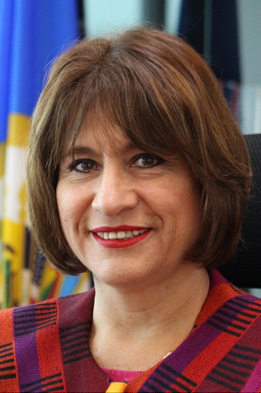
Ana María Calderón Boy
Special Representative of the Secretary General/Interim Spokesperson of the MACCIH
A Peruvian lawyer, she has worked in the Office of the Attorney General of Peru for 32 years. She was a criminal prosecutor, an anti-drug prosecutor (during which she dismantled international drug trafficking organizations), anti-corruption prosecutor (she participated in oral trials against high-level public officials, military, and magistrates), and prosecutor of the International Judicial Cooperation and Extradition Unit of the Office of the Attorney General. In recent years, until July of 2017, she was senior prosecutor and Chief of the Office of Internal Control of the Office of the Attorney General, in charge of investigating judges and prosecutors for crimes of function and investigating and sanctioning prosecutors for disciplinary offenses. Read more »
 Ana María Calderón Boy
Ana María Calderón Boy
Special Representative of the Secretary General/Interim Spokesperson of the MACCIH
A Peruvian lawyer, she has worked in the Office of the Attorney General of Peru for 32 years. She was a criminal prosecutor, an anti-drug prosecutor (during which she dismantled international drug trafficking organizations), anti-corruption prosecutor (she participated in oral trials against high-level public officials, military, and magistrates), and prosecutor of the International Judicial Cooperation and Extradition Unit of the Office of the Attorney General. In recent years, until July of 2017, she was senior prosecutor and Chief of the Office of Internal Control of the Office of the Attorney General, in charge of investigating judges and prosecutors for crimes of function and investigating and sanctioning prosecutors for disciplinary offenses.
PhD candidate in Law and Political Science from the National University of San Marcos and has a Magister degree in Constitutional Law. Additionally, she possesses a Postgraduate Specialization in “Constitutional Guarantees of Investigation and Proof in Criminal Proceedings” from the University of Castilla-La Mancha-Toledo, Kingdom of Spain and the Laureate Certificate in Higher Education, awarded by Laureate International Universities. She has attended numerous professional training courses and was a speaker at various academic events.
Her career as a university professor includes the exercise of the Judicial Academy of Peru, preparing aspiring lawyers to become judges and prosecutors since 2008; in the School of the Public Ministry and in the Private University of the North. She received several awards in her country for her professional performance and human quality.
She joined the MACCIH-OAS in August of 2017 as an International Prosecutor, assuming the direction of the Active Collaboration Unit. She played an outstanding role in the implementation and strengthening of the Special Prosecution Unit to Fight Corruption-Related Impunity (UFECIC). In February of 2018 she was appointed as Interim Spokesperson for the Mission, taking charge of the transition stage until the new Spokesperson was appointed. Later she served as Alternate General Coordinator and Coordinator of the Division for Preventing and Combating Corruption and Impunity of the MACCIH-OAS. In July of 2019 she was appointed again as Interim Spokesperson for the Mission.
Michael Grunwald
Coordinator of the Criminal Justice System Reform Division
Lawyer with studies in Chile and Saarbruecken/Germany with focus on Juvenile Criminal Law and Execution of Criminal Sanctions against Juveniles. Read more (Spanish only) »
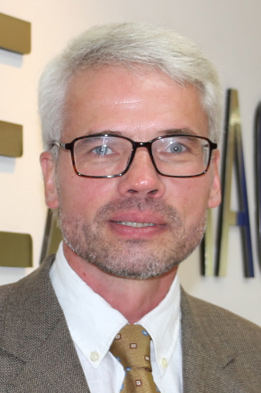 Michael Grunwald
Michael Grunwald
Coordinator of the Criminal Justice System Reform Division
Abogado con estudios jurídico en Chile y en Saarbruecken/Alemania con enfoque en derecho penal juvenil y ejecucion de sanciones penales contra juveniles. Lleva 25 años de experiencia laboral como fiscal en la capital alemana de Berlin, una de las fiscalias mas grandes de Europa, recopilando experiencia especializada en derecho penal antidrogas y derecho penal juvenil.
Dentro de su carrera profesional ejerció el cargo de portavoz de la fiscalia general de Berlin, asumió cargos de asesoriamiento jurídico en el ministerio federal de finanzas y la oficina del Presidente Federal de la Repúplica Alemana.
Previo a su incorporación a la MACCIH/OEA trabajó como Fiscal Jefe de división de Justicia Penal.

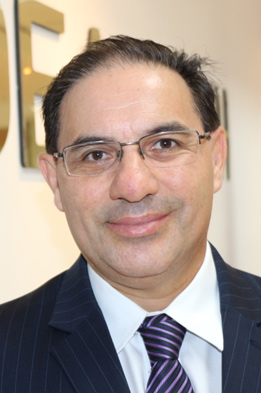
Marco Antonio Villeda
Interim Coordinator of the Division for Preventing and Combating Corruption
Lawyer and Notary, of Guatemalan nationality, with more than 28 years of judicial career, where he has served as Civil Judge, Criminal Judge (of guarantees and sentence) and Magistrate of Appeals in criminal matters and extinction of domain. Read more (Spanish only) »
 Marco Antonio Villeda
Marco Antonio Villeda
Interim Coordinator of the Division for Preventing and Combating Corruption
Abogado y Notario, de nacionalidad guatemalteca, con más de 28 años de carrera judicial, donde se ha desempeñado como Juez Civil, Juez Penal (de garantías y de sentencia) y Magistrado de Apelaciones en materia penal y extinción de dominio. Tuvo a su cargo el juzgamiento de varios casos emblemáticos de corrupción y crimen organizado en su país. Ejerció también como Juez de Extinción de Dominio, siendo el primer juez de extinción de dominio de su país y desde donde emitió sentencias que permitieron la recuperación a favor del Estado, de bienes obtenidos como producto de actividades ilícitas relacionadas con criminalidad organizada y corrupción pública.
Posee estudios de maestría en Derecho Penal en la Universidad de San Carlos de Guatemala, cursos de Post Grado de especialización en Derecho Penal en la Universidad de Salamanca, España; Extinción de Dominio, Métodos Especiales de Investigación y Administración de Justicia.
Ha sido titular de la cátedra de Derecho Penal y Procesal Penal en las universidades Rafael Landívar, Istmo y Mariano Gálvez de Guatemala, también ha ejercido como docente en la escuela de Estudios Judiciales de su país y en diversas instituciones de cooperación internacional a nivel regional, capacitando a jueces y fiscales en diversos temas jurídicos relacionados a investigación de redes de corrupción y criminalidad organizada, así como en investigación de bienes de origen ilícito, expositor invitado en varios congresos jurídicos. Se unió a la Misión en enero de 2018, luego de ser seleccionado mediante concurso de oposición para el cargo de Juez Internacional.
.
Virginia Contreras
Coordinator of the Division of Public Security
Born in Venezuela. Lawyer, Master in security and defense. She has extensive experience in the fields of security, penitentiary affairs and in the criminal area. In addition, she has studies in forensic psychiatry, criminalistics, counter-terrorism and counter-insurgency, and civil-military relations, among others. Read more (Spanish only) »
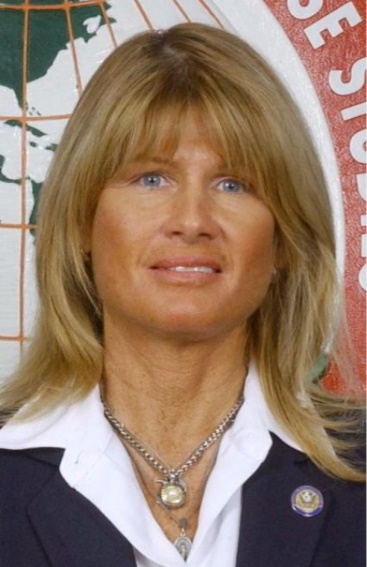 Virginia Contreras
Virginia Contreras
Asesor Especial contra la Corrupción y la Impunidad
Virginia Contreras es abogada, magister en seguridad y defensa, nacida en Venezuela. Posee una extensa experiencia en el tema de seguridad, asuntos penitenciarios y en el área penal, con estudios en psiquiatría forense, criminalística, contra-terrorismo y contra-insurgencia, y relaciones civil-militares, entre otros.
Se ha desempeñado como Directora de Prisiones y como Juez Penal y de Salvaguarda del Patrimonio Público, así como Juez relatora en la Corte Primera en lo Contencioso Administrativo en Venezuela. De igual forma ha actuado como abogada en relevantes causas penales en su país, y como académica en las áreas de Criminología y Derecho Penal en la Universidad Central de Venezuela. Fue embajadora de su país ante la Organización de los Estados Americanos.
Ha participado en innumerables foros y conferencias, y ha sido profesora invitada en distintas universidades e instituciones en el continente y en otras partes del mundo sobre seguridad, gobernanza, democracia y Derechos Humanos, temas sobre los que ha publicado numerosos artículos. En los últimos años trabajó en el Centro de Estudios Hemisféricos de Defensa, de la Universidad de Defensa Nacional del Departamento de Defensa de Estados Unidos, en Washington, DC. Es consultora y analista internacional en temas vinculados a la seguridad y defensa, democracia, justicia penal y Derechos Humanos.

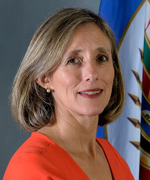
Maria Fernanda Trigo
Project Coordinator of the MACCIH
A Bolivian national. She currently serves as Director of the OAS Department for Effective Public Management where she has set as its mission to strengthen public institutions in the Americas so they are more transparent, effective and have mechanisms for citizen participation. Previously, Ms. Trigo performed the functions of Deputy Director of the Department of Democratic Sustainability and Special Missions in the Political Affairs Secretariat where she led the development and implementation of a system for political analysis for the OAS General Secretariat. Read more »
 Maria Fernanda Trigo
Maria Fernanda Trigo
Project Coordinator of the MACCIH
A Bolivian national. She currently serves as Director of the OAS Department for Effective Public Management where she has set as its mission to strengthen public institutions in the Americas so they are more transparent, effective and have mechanisms for citizen participation. Previously, Ms. Trigo performed the functions of Deputy Director of the Department of Democratic Sustainability and Special Missions in the Political Affairs Secretariat where she led the development and implementation of a system for political analysis for the OAS General Secretariat. Ms. Trigo has worked at the OAS since January 1999. She began her career at the OAS as part of the initial team of the Summit of the Americas Secretariat, supporting the preparation and negotiation process of the Declarations and Action Plans for the Quebec (2001), Monterrey (2004) and Mar del Plata (2006) Summits of the Americas.
Ms. Trigo previously worked at the Permanent Mission of Bolivia to the OAS as alternate representative with the responsibility of supporting the organization and negotiation of documents for the Summit on Sustainable Development held in Santa Cruz, Bolivia, in 1996.
Ms. Trigo has a Masters in International Relations from Georgetown University, Washington D.C., and a BA in Mathematics from St. Mary's College in South Bend, Indiana.
Katalina Montaña
Liaison Officer of MACCIH at OAS Headquarters
Chief of Mediation and Dialogue
Frequently Asked Questions
-
How did the MACCIH begin?
After various public protests triggered in March 2015 by a corruption scandal in the Honduran Institute of Social Security (IHSS), the government of Honduras requested the General Secretariat of the OAS to facilitate a process of national dialogue to build a mechanism to combat corruption and impunity in the country.
The General Secretariat met repeatedly with the Government and with the social, economic and political sectors in order to propose a set of strategic guidelines that establish a comprehensive mechanism to combat corruption and impunity in Honduras.
Many of the recommendations from the process were included in the final proposal that created the agreement signed between the General Secretariat and the Government of Honduras on January 19, 2016 at the headquarters of the Organization.
-
What is the strategic approach of the MACCIH?
The MACCIH supports the country by identifying aspects that encourage or allow corruption to spread. To that end, it works by proposing reforms that have strategic impact on both prevention and prosecution of corruption offenses.
Key in its job is to
identify the sectors sensitive to corruption like public procurement, construction, public health, customs, mining and extractive, environmental, justice and security, among others, where it is necessary to introduce better regulation and management structure, as well as improving control systems and regulation of the country.
Of great importance is the existence of a legal structure to fight against corruption that is effective and predictable. With the arrival of the MACCIH, the Judicial Power created this structure with national and exclusive jurisdiction over crimes of corruption, a key component to start changing the story.
-
Can the MACCIH work on investigations of specific cases?
Yes. In fact, we will have a team of prosecutors, judges and top-level international forensic experts that help break up large networks of corruption. The Mission selects, advises, evaluates and certifies the group of Honduran prosecutors and judges who will work in the corruption cases they determine.
-
Who will select the chases where the MACCIH will be involved?
The Mission acts autonomously. It is the Mission -the one and only- who selects and decides the cases of corruption in which it will work with national authorities. In addition, it will work together with civil society in the construction of a system of observatories, to monitor and evaluate the progress of Honduran Justice System, and will actively cooperate with the Government of Honduras to facilitate the implementation of the Inter-American Convention Against Corruption and the Follow-up Mechanism for Implementation (MESICIC).





